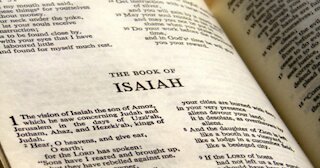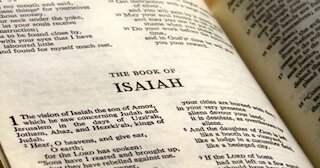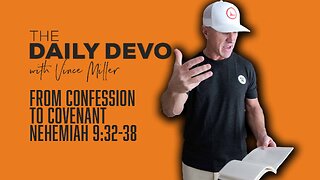Episode 1616: Books of the Bible - Nehemiah
Nehemiah
The Book of Nehemiah is a historical book of the Hebrew Bible that tells the story of the rebuilding of the walls of Jerusalem and the spiritual revival of the Jewish people after the Babylonian exile. Nehemiah was a Jewish cupbearer to the Persian king Artaxerxes I. When he heard that Jerusalem was in ruins, he prayed to God for help. God answered his prayer and softened the king's heart, so that Artaxerxes gave Nehemiah permission to return to Jerusalem and rebuild the walls.
Nehemiah arrived in Jerusalem and immediately began the work of rebuilding the walls. He faced opposition from the Samaritans and other enemies, but he overcame all obstacles through prayer and perseverance. The walls were completed in just 52 days, and Jerusalem was once again a fortified city.
In addition to rebuilding the walls, Nehemiah also reformed the Jewish people spiritually. He led them in a covenant renewal ceremony, and he taught them the law of Moses. He also made sure that the priests and Levites were carrying out their duties properly.
The Book of Nehemiah is a story of faith, courage, and perseverance. It shows us what can be accomplished when we trust God and work together for his glory.
The Protestant work ethic is a set of beliefs about the importance of hard work, thrift, and delayed gratification. It is often associated with the Protestant Reformation of the 16th century, and particularly with the writings of Martin Luther and John Calvin.
The Protestant work ethic teaches that work is a calling from God, and that it is through hard work and diligence that individuals can achieve salvation. It also emphasizes the importance of thrift and saving money, as these qualities allow individuals to accumulate wealth and build a strong foundation for their families and communities.
The traditional Catholic work ethic is also based on the importance of hard work and diligence, but it differs from the Protestant work ethic in several key ways. First, the Catholic work ethic does not teach that work is a calling from God in the same way that the Protestant work ethic does. Second, the Catholic work ethic emphasizes the importance of using wealth to help others, rather than accumulating it for oneself. Third, the Catholic work ethic is more tolerant of leisure time and recreation than the Protestant work ethic.
Examples of the Protestant work ethic in action:
The Puritans who settled in North America in the 17th century were known for their strong work ethic and their commitment to thrift.
The Industrial Revolution in the 19th century was fueled by the Protestant work ethic, as workers were encouraged to work long hours and save their money.
The rise of capitalism in the West is often attributed to the Protestant work ethic, as it encouraged individuals to accumulate wealth and start businesses.
Examples of the traditional Catholic work ethic in action
The Catholic Church has a long history of supporting charitable organizations and social justice initiatives.
Many Catholic schools and universities emphasize the importance of service to others.
Catholic social teaching teaches that wealth should be used to help the poor and marginalized.
It is important to note that both the Protestant and Catholic work ethics can be positive forces in society. The Protestant work ethic has helped to drive economic growth and innovation, while the traditional Catholic work ethic has helped to promote social justice and compassion.
Here is a more detailed overview of the book:
Chapters 1-2: Nehemiah hears about the state of Jerusalem and prays to God for help. God answers his prayer and softens the king's heart, so that Artaxerxes gives Nehemiah permission to return to Jerusalem and rebuild the walls.
Chapter 1
Nehemiah begins the book by telling us that he was cupbearer to the Persian king Artaxerxes I. He was in the city of Susa when he heard from his brother Hanani that Jerusalem was in ruins, and that the walls had been broken down and the gates had been burned by fire.
Nehemiah was deeply saddened by this news, and he fasted and prayed for three days. In his prayer, he confessed the sins of the Jewish people and asked God to have mercy on them. He also asked God to give him the wisdom and courage to rebuild the walls of Jerusalem.
Chapter 2
Four months later, Nehemiah was serving the king wine when the king noticed that he was sad. The king asked Nehemiah why he was sad, and Nehemiah told him about the state of Jerusalem.
The king's heart was softened by Nehemiah's story, and he gave him permission to go to Jerusalem and rebuild the walls. The king also gave Nehemiah letters to the governors of the provinces west of the Euphrates River, asking them to provide Nehemiah with safe passage and assistance.
Nehemiah thanked the king for his generosity, and he set out for Jerusalem immediately.
Summary
Chapters 1-2 of Nehemiah introduce us to the main character and set the stage for the story that is to follow. Nehemiah is a faithful Jew who is deeply concerned about the state of Jerusalem. He is willing to risk his position and his life to rebuild the walls of the city and restore the Jewish people to their former glory.
These chapters also teach us the importance of prayer. Nehemiah knew that he could not accomplish his task on his own, so he turned to God for help. God answered his prayer and gave him the wisdom, courage, and resources he needed to succeed.
We can learn a lot from Nehemiah's example. When we are faced with difficult challenges, we should turn to God in prayer and trust him to help us.
Chapters 3-7: Nehemiah arrives in Jerusalem and begins the work of rebuilding the walls. He faces opposition from the Samaritans and other enemies, but he overcomes all obstacles through prayer and perseverance. The walls are completed in just 52 days.
Here is a more detailed summary of Nehemiah chapters 3-7:
Chapter 3
Nehemiah begins rebuilding the walls of Jerusalem by assigning different sections of the wall to different groups of people. He starts at the Sheep Gate and works his way around the city, ending at the Horse Gate.
The priests and other religious leaders take the lead in the rebuilding effort. They are followed by the nobles and government officials. The common people also pitch in, working on the sections of the wall that are assigned to them.
Chapter 4
When the Samaritans and other enemies of the Jewish people hear about Nehemiah's plan to rebuild the walls of Jerusalem, they are furious. They try to stop the work by making threats and spreading lies.
Nehemiah refuses to be intimidated by his enemies. He prays to God for protection and continues to work on the walls. He also posts guards to watch for enemies and to protect the workers.
Chapter 5
The common people who are working on the walls are struggling financially. They have to borrow money from the nobles and government officials to buy food and supplies.
Nehemiah is concerned about the plight of the common people, so he calls a meeting of the nobles and officials. He rebukes them for charging interest on the loans they have made to the people. He also convinces them to forgive the debts of the poor people.
Chapter 6
Nehemiah's enemies continue to try to stop the work on the walls. They send him threatening letters and try to lure him into a trap.
Nehemiah remains steadfast in his resolve to rebuild the walls. He refuses to meet with his enemies, and he continues to work on the walls despite the threats.
Chapter 7
After 52 days of hard work, the walls of Jerusalem are finally completed! Nehemiah holds a grand celebration to mark the occasion. He invites all of the people to come together and rejoice.
Summary
Chapters 3-7 of Nehemiah chronicle the challenges and triumphs of the rebuilding of the walls of Jerusalem. Nehemiah faced opposition from his enemies at every turn, but he overcame all obstacles through prayer, perseverance, and faith.
These chapters teach us several important lessons:
It is important to stand up for what is right, even when it is difficult. Nehemiah refused to be intimidated by his enemies, and he continued to work on the walls of Jerusalem despite the threats.
We should be willing to make sacrifices for the sake of God's people. Nehemiah rebuked the nobles and officials for charging interest on the loans they had made to the poor people. He also convinced them to forgive the debts of the poor people.
God is faithful to those who trust him. Nehemiah prayed to God for help, and God answered his prayer. God gave Nehemiah the wisdom, courage, and resources he needed to rebuild the walls of Jerusalem.
We can learn a lot from Nehemiah's example. When we are faced with challenges and opposition, we should remember Nehemiah's story. We should stand up for what is right, make sacrifices for the sake of God's people, and trust God to help us.
Chapters 8-10: Nehemiah leads the people in a covenant renewal ceremony and teaches them the law of Moses. He also makes sure that the priests and Levites are carrying out their duties properly.
Here is a more detailed summary of Nehemiah chapters 8-10:
Chapter 8
On the first day of the seventh month, all of the people gather together in the square before the Water Gate. They ask Ezra the priest to bring out the Book of the Law of Moses, which the Lord had commanded for Israel.
Ezra reads from the Book of the Law from sunrise to noon. The people listen carefully and are deeply moved by what they hear. They weep and confess their sins and the sins of their ancestors.
Levite teachers explain the meaning of the Law to the people, and the people rejoice. They celebrate the Feast of Tabernacles for seven days, as they had not done since the days of Joshua.
Chapter 9
On the twenty-fourth day of the same month, the Israelites gather together, fasting and wearing sackcloth and putting dust on their heads. They separate themselves from all foreigners and confess their sins and the sins of their ancestors.
They stand where they are and read from the Book of the Law of the Lord their God for a quarter of the day, and spend another quarter in confession and in worshiping the Lord their God.
The Levites then lead the people in a prayer of confession and renewal. They confess the sins of their ancestors and ask God to forgive them and to restore them to his favor. They also renew their covenant with God, pledging to obey his laws and commands.
Chapter 10
On the same day, the leaders of the people sign a covenant with God. They promise to obey the laws of God, including the laws regarding the Sabbath, marriage, and business dealings. They also promise to support the temple and the priests and Levites.
The people also promise to separate themselves from the foreign peoples who live around them. They want to be a holy people who are set apart for God.
Summary
Chapters 8-10 of Nehemiah describe the spiritual revival of the Jewish people. Ezra reads the Book of the Law to the people, and they are deeply moved by what they hear. They repent of their sins and renew their covenant with God.
These chapters teach us the importance of God's Word. When we study God's Word and apply it to our lives, it changes us. It makes us more holy and more like Jesus Christ.
These chapters also teach us the importance of community. The Jewish people came together as a community to worship God and to confess their sins. They also supported each other in their commitment to obey God's laws.
We can learn a lot from the example of the Jewish people. We should study God's Word regularly and apply it to our lives. We should also be part of a community of believers who support each other in their walk with Christ.
Chapters 11-13: Nehemiah registers the people and assigns them to live in Jerusalem. He also builds a citadel and appoints guards for the city.
Here is a more detailed summary of Nehemiah chapters 11-13:
Chapter 11
Nehemiah registers the people and assigns them to live in Jerusalem. He does this to ensure that the city is populated and defended.
Nehemiah also builds a citadel and appoints guards for the city. He knows that Jerusalem will continue to face opposition from its enemies, so he wants to make sure that the city is well-protected.
Chapter 12
Nehemiah dedicates the walls of Jerusalem in a grand ceremony. He invites the priests and Levites to participate, and they sing and play instruments as they march around the city.
Nehemiah also appoints two leaders, Eliashib the priest and Ezra the scribe, to be responsible for the city. Eliashib is responsible for the religious affairs of the city, and Ezra is responsible for the education of the people.
Chapter 13
Nehemiah returns to the Persian court for a time. When he returns to Jerusalem, he finds that the people have backslidden and are not following the law of Moses.
Nehemiah is furious. He reforms the people and restores the worship of God. He also expels Tobiah the Ammonite, who has been leading the people astray.
Summary
Chapters 11-13 of Nehemiah show us that Nehemiah was not only concerned with rebuilding the walls of Jerusalem, but also with rebuilding the spiritual lives of the Jewish people. He knew that Jerusalem could not be a truly fortified city if its inhabitants were not following God's laws.
These chapters teach us the importance of spiritual discipline. We need to be diligent in studying God's Word, praying, and worshiping him. We also need to be careful about the people we associate with and the influences we allow into our lives.
We can also learn from Nehemiah's example of courage and leadership. He was not afraid to stand up for what was right, even when it was difficult. He also led the people by example, living a life that was faithful to God.
When we are faced with challenges and opposition, we can remember Nehemiah's story. We can trust God to give us the wisdom, courage, and strength we need to persevere.
Chapters 14-16: Nehemiah returns to the Persian court for a time. When he returns to Jerusalem, he finds that the people have backslidden and are not following the law of Moses. He reforms the people and restores the worship of God.
Here is a more detailed summary of Nehemiah chapters 14-16:
Chapter 14
Nehemiah returns to the Persian court and serves King Artaxerxes for twelve years. During that time, he continues to pray for the Jewish people and to seek God's guidance.
After twelve years, Nehemiah asks the king for permission to return to Jerusalem. The king agrees, and Nehemiah sets out on his journey.
When Nehemiah arrives in Jerusalem, he is dismayed to find that the people have backslidden again. They have allowed Tobiah the Ammonite to live in the temple, and they have stopped supporting the priests and Levites.
Nehemiah is furious. He expels Tobiah from the temple and reforms the people. He also restores the support for the priests and Levites.
Chapter 15
Nehemiah continues to reform the people and to restore the worship of God. He also makes sure that the people are keeping their promises to God.
Nehemiah is especially concerned about the people's observance of the Sabbath. He knows that the Sabbath is a holy day that is set apart for God, and he wants the people to respect it.
Nehemiah also warns the people against marrying foreigners. He knows that intermarriage will lead to the assimilation of the Jewish people and the abandonment of their faith.
Chapter 16
Nehemiah prays for God's blessing on the Jewish people. He asks God to forgive their sins and to help them to remain faithful to him.
Nehemiah also asks God to remember him for his good deeds. He has served God faithfully and has worked hard to rebuild the walls of Jerusalem and to reform the people.
Summary
Chapters 14-16 of Nehemiah show us that Nehemiah was not only a great leader, but also a man of deep faith and prayer. He was committed to serving God and to leading the Jewish people back to a life of obedience to God's laws.
These chapters teach us the importance of perseverance. Nehemiah faced many challenges in his ministry, but he never gave up. He continued to serve God faithfully and to work for the good of the Jewish people.
These chapters also teach us the importance of prayer. Nehemiah prayed regularly for God's guidance and help. He knew that he could not accomplish anything on his own, so he relied on God's power and strength.
We can learn a lot from Nehemiah's example. We should be committed to serving God and to leading others to a life of obedience to God's laws. We should also persevere in our faith, even when we face challenges. And we should pray regularly for God's guidance and help.
The Book of Nehemiah is a valuable resource for Christians today. It teaches us about the importance of prayer, perseverance, and faith. It also shows us how to live a life that is pleasing to God.
-
 24:49
24:49
CatholicReboot
2 months ago $0.01 earnedEpisode 1940: The Books of the Bible - Ecclesiastes
147 -
 13:47
13:47
CatholicReboot
5 months ago $0.11 earnedEpisode 1714: Books of the Bible - Esther
1451 -
 59:40
59:40
Bitcoin01
2 months agoThe Book of Nehemiah (NASB Audio Bible Non Dramatized)
37 -
 3:53
3:53
The Daily Devo by Vince Miller
3 months agoIs Your Name In The Book? | Nehemiah 12:1-26
35 -
 5:57
5:57
The Skeptical Partisan
2 years agoIsaiah Chapter 36
44 -
 10:10
10:10
The Skeptical Partisan
2 years agoIsaiah Chapter 37
63 -
 7:43
7:43
The Daily Devo by Vince Miller
4 months agoFrom Confession to Covenant | Nehemiah 9:32-38
412 -
 5:50
5:50
The Daily Devo by Vince Miller
4 months agoScriptural Conviction That Results In Renewal | Nehemiah 10:31
40 -
 5:10
5:10
The Daily Devo by Vince Miller
3 months agoGetting In Line With Scripture | Nehemiah 13:1-3
307 -
 7:37
7:37
The Daily Devo by Vince Miller
4 months agoRecommitting to Marital Purity | Nehemiah 10:30
27